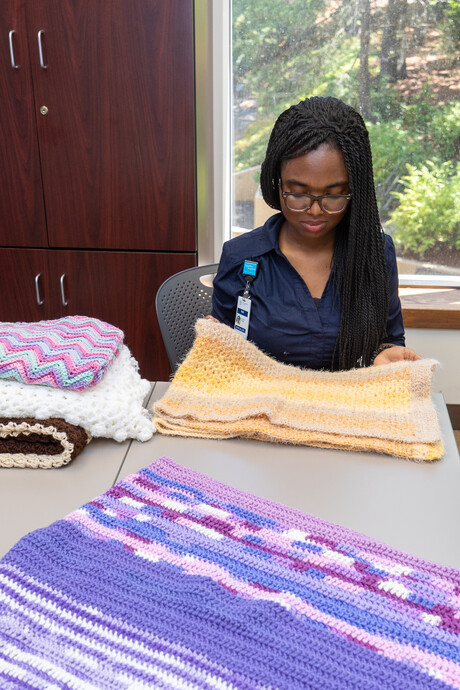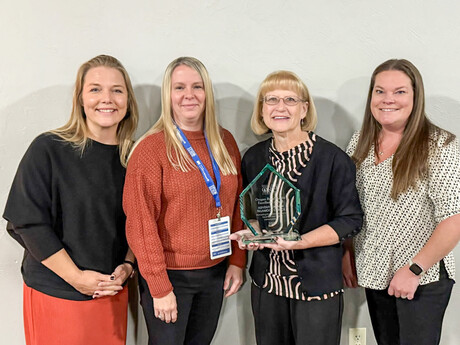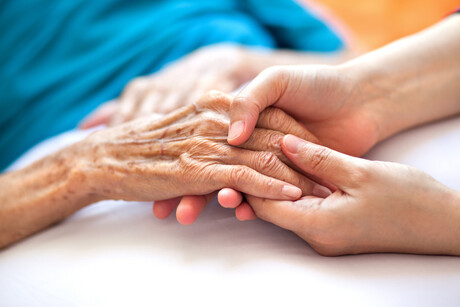When a former patient wanted to say thank you to Adventist Health Portland, she started a knitting ministry.
The neatly folded stack of handcrafted lap blankets sitting on the desk of Tino Tsikirai, Adventist Health chaplain, may look out of place in a hospital office setting.
Variegated yarns and assorted textures catch the eye of office visitors but only hint at the intriguing story of where the blankets came from, why they’re here and where they’re going.
The story begins in the busy, skillful hands of knitters and crocheters at East Woods Presbyterian Church in Vancouver and unfolds gently in rooms across Adventist Health Portland, where family members have gathered around loved ones with hope and sometimes grief.
Each blanket is as unique as the patient who will receive it. The lap blankets are known as comfort shawls, love blankets or prayer shawls, depending on the patient's situation. They are lovingly crafted by Linda, Marilyn, Carol, Alta, Sue, Shirley, Conni, Betsy, Vicky, Yvette, Marcy and others at the church. The former patient who started the knitting group will remain anonymous.
The blankets arrive at Adventist Health Portland's Mission and Spiritual Care office — Tsikirai’s home base — with gift bags and cards bearing words of encouragement for patients and their family members. One line of the message says, “May the one who receives this blanket be cradled in hope, kept in joy, graced with peace and wrapped in love.”
Tsikirai recalls visiting with a patient not long ago who was dying. “We talked, and we processed what she was going through. Then I remembered the love blankets. I went to my office, chose a blanket with a very specific shade of deep teal and took it to the patient’s room. Her eyes filled with tears when she saw it," said Tsikirai.
“‘That is the exact color on my couch at home,’ the patient said. ‘My whole house is made up of this color.’ It was such a comforting moment for her to have a little bit of home. It was beautiful to see her not just take in my words of comfort and hope, but also to have a tangible representation of comfort and warmth and safety — even in that moment,” said Tsikirai.
Yarn Fused With Love
There should be a word for the comfort of a blanket placed gently on you by loving hands, its weight a final nudge into deep sleep as you nod off on a chilly day. Perhaps this is hygge — the Danish concept of contentment and well-being.
In the creation of these lap blankets, part of that sense of well-being comes from the compassionate care of the chaplains and other caregivers, and part comes from an alchemy of love fused with yarn woven as church ladies chat and pray for patients who will receive their knitted gifts.
“The ladies at the church make them as quickly as possible because as soon as we get a set, we use them up,” said Tsikirai. “Some days in the office, there are just a few. On days when we get a new batch, the office is full of them. These blankets go quickly. Sometimes nurses from the floors will call the chaplains asking us to deliver them to the different units or specific patients. That’s how much these blankets have become a part of the caring culture here."
Patients get to take the blankets with them when they leave the hospital. Some go home; others go to a care facility or hospice. “It’s a tangible reminder that they are cared for, that they are seen for being human and that they are loved,” said Tsikirai. “In a hospital where there is a lot of white and blue, patients often don’t get to see a lot of bright colors, so it’s also a touch of life and hope.”
When a patient passes away, their family gets to keep the blanket. “It gives them something to hold onto besides the memories of the hospital,” said Tsikirai.
Chaplains walk a careful line when visiting patients. It isn’t a time for proselytizing or a prophecy seminar. It’s time to show up as the hands and feet of Jesus, time for comfort, compassion and grace.
“When we walk into rooms, we don’t assume a person is religious,” said Tsikirai. “Sometimes when people hear the word ‘chaplain,’ a lot of religious trauma is triggered and they’re afraid to see someone who represents religion. So, when I walk into a room, it isn’t about having an agenda. It’s about seeing the person for who they are and helping them journey through whatever they’re going through.”
Where Is God When Things Go Wrong?
In June, Tsikirai was with a family going through a very complex grief process.
“I provided chaplain support as they were experiencing loss — holding space for their tears, providing emotional and spiritual support, and being present — but there seemed to be something more that was needed,” said Tsikirai.
She went to the office to look for a blanket and chose one in a specific color connected with what the family was going through.
“I took it to the room and presented the blanket to the family that was standing around the hospital bed. Together we placed the blanket over the body of the patient," said Tsikirai.
When the blanket touched the patient’s body and family members placed their hands on it, their weeping resumed, but it was different this time. "They were tears of — I don’t know how else to describe it — but more tears of comfort. There was a change in the tone of the tears," Tsikirai remembered.
“The texture of that yarn was much softer than some of the textures we receive. In this delicate situation, the yarn was delicate and soft. In this delicate situation, the color was meaningful to what the family was going through," said Tsikirai. "Everything, including the size of the blanket, was as if it was custom made for our patient who had passed."
That day at the hospital had been a full day for Tsikirai. She'd worked with grieving families, sat with other families experiencing different types of emotions — some happy and some painful. But the moment that made her cry at the end of the day was the moment with that blanket.
"Three months before that day was when the ladies would've started making the blanket. Three months ago, somebody unknowingly went to the store and bought yarn that was the color, the texture and the size we needed for this family," said Tsikirai.
“It made me think of how God cares about the little details," said Tsikirai. "He didn’t take away the pain the family was going through, but through that blanket, it was as if He was saying, ‘I’m still here. Even if the pain is still here, I’m still here.’"
Tsikirai continued, "It made me think of how many times in my life little things go wrong, big things go wrong and I’m stressing. If God can care about the size, color and texture of a blanket, what makes me think He doesn’t care about everything else in my life? It also taught me something about where God is even in the moments when things don’t fully make sense.”
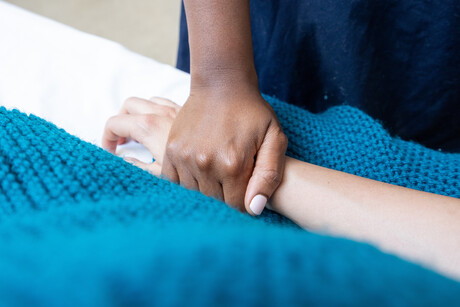
Blankets knitted months before are often the exact color needed for specific patients.
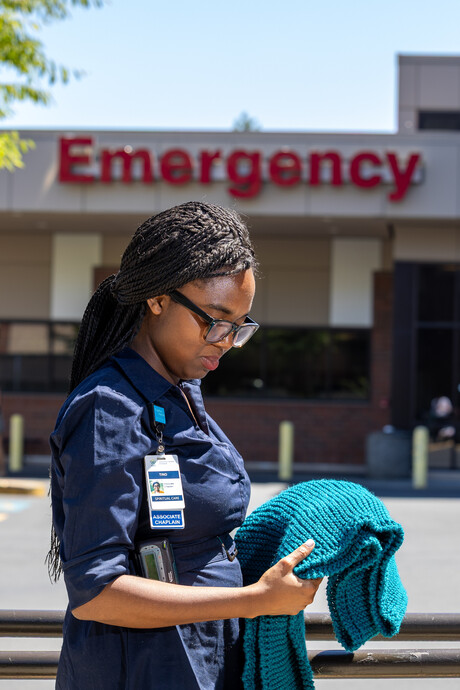
Tino Tsikirai, Adventist Health chaplain, gives handmade blankets to patients.
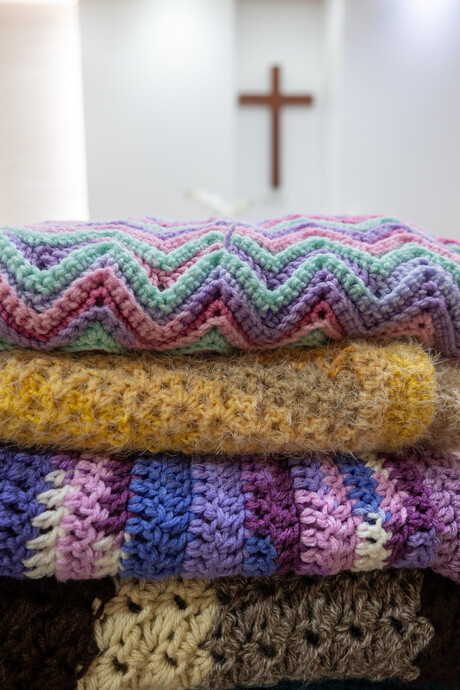
Each blanket is as unique as the patient who will receive it.
